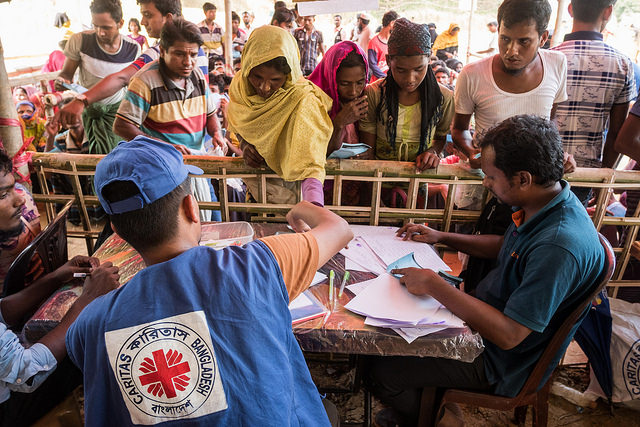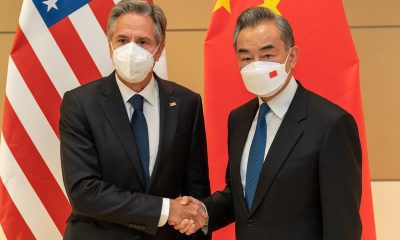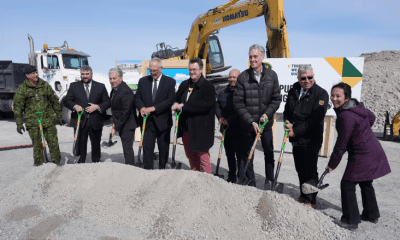News
Among Rohingya, refugee squalor can seem better than home

Both Bangladesh and Myanmar insist the repatriations of Rohingya Muslims will go smoothly, with thousands of refugees who fled their homes in terror just a few months ago crossing the border back into Myanmar and returning safely to their villages. (Photo by Mahmud Rahman for CRS/Caritas Bangladesh via Catholic Diocese of Saginaw/Flickr, CC BY-ND 2.0)
DHAKA, Bangladesh — Both Bangladesh and Myanmar insist the repatriations of Rohingya Muslims will go smoothly, with thousands of refugees who fled their homes in terror just a few months ago crossing the border back into Myanmar and returning safely to their villages.
Eventually, more than 650,000 Rohingya are supposed to leave Bangladesh in a process that guarantees them “safety, security and dignity,” according to an agreement both countries signed late last year.
But with the first repatriations scheduled for as early as Tuesday, and more than 1 million Rohingya Muslims living in refugee camps in Bangladesh, international aid workers, local officials and the refugees themselves say preparations have barely begun. Many refugees say they would rather contend with the squalor of the camps rather than the dangers they could face if they return home.
“If they send us back forcefully we will not go,” said Sayed Noor, who fled his village in Myanmar last August, amid a torrent of Rohingya heading for safety. He says Myanmar authorities “have to give us our rights and give us justice.”
“They will have to return all our wealth that they have looted and hold people accountable. They will have to compensate us. We came here because we are fighting for those things,” he said. “If we don’t get all of this, then what was the point of coming here?”
David Mathieson, a longtime human rights researcher who has spent years working on Rohingya issues, heaped scorn on the agreement.
“It’s a fantasyland, make-believe world that both governments are in,” he said in an interview in Yangon, Myanmar’s main city, noting that security forces there had just forced hundreds of thousands of Rohingya across the border. “Now you’re expecting them to come back, as if they’re in a conga line of joy after what you did to them?”
The Rohingya Muslims have long been treated as outsiders in largely-Buddhist Myanmar, derided as “Bengalis,” illegal immigrants from Bangladesh, even though many Rohingya families have lived in Myanmar for generations. Most have been denied citizenship since 1982, effectively rendered stateless. They are denied freedom of movement and other basic rights.
Most live in poverty in Myanmar’s Rakhine state, near the Bangladesh border. Marked by their religion and their language — most Rohingya speak a dialect of Bengali, while most of their neighbours speak Rakhine — they are easy to target.
The recent surge of violence erupted after an underground insurgent group, the Arakan Rohingya Salvation Army, attacked at least 30 security outposts in Myanmar in late August. The military and Buddhist mobs then launched retaliatory attacks on Rohingya across Rakhine in a frenzy of killings, rapes and burned villages. The U.N. has described the violence as “textbook ethnic cleansing.”
The attacks, which Doctors Without Borders believes have left at least 6,700 Rohingya dead, sowed terror across Rohingya communities, sending more than 650,000 people fleeing across the border. Most came in the first month or so after the violence began, but some continue to trickle into Bangladesh, complaining of ill-treatment by authorities.
In early January, following up on their November 2017 agreement, Bangladesh and Myanmar signed a deal to begin sending back the refugees starting Tuesday. Officials have said they expect some 1,500 refugees to go back each week, though only refugees with identity documents — which most Rohingya lack — will be allowed into Myanmar.
Bangladesh and Myanmar are both eager to have the repatriations begin. Bangladesh has grown weary of hosting Rohingya refugees, who have been spilling across the border for decades to escape violence at home. More than a million Rohingya are now believed to live in Bangladesh. Myanmar, meanwhile, wants the repatriations to lessen the international condemnation it has faced for the violence.
In Myanmar, officials have started building sprawling camps for returning refugees. Forty buildings have been finished already in the Hla Po Kaung transit camp, enough for more than 3,000 refugees, state media has reported. Eventually, the camp will have 625 buildings, enough for 30,000 refugees. In theory the returnees will stay only temporarily in the camp before going home, though many Rohingya villages were burned to the ground during the violence.
In Bangladesh, there are almost no signs of preparations. A Bangladesh official who oversees the area where most of the camps are located said last week that “we have not finalized anything yet.”
Aid workers say some refugees may want to return — perhaps the 500 or so Bengali-speaking Hindus who also fled the Rakhine state violence, and the handful of Rohingya who have managed to acquire citizenship documents.
But how many more?
Not many, experts say.
“I think that the (Myanmar) government knows very well that only a few people will go back,” said Chris Lewa, the director of the human rights research group the Arakan Project. But officials want the good publicity that could come with repatriations, she said.
“When the majority of Rohingya refuse to come back, the Myanmar government will say ‘See, we have done what we can for them to return, but they refuse to come back and prefer to stay in Bangladesh, which was their own country,”’ she said.
Inside Rakhine, there are few signs that people want their former Rohingya neighbours to return.
“International pressure, because of human rights and humanitarianism, means we have to accept them back, even though we don’t want to,” Than Tun, a Buddhist leader in Sittwe, the Rakhine state capital, said in a telephone interview.
He dismissed the idea that the Rohingya had fled their homes. “We think that these Bengalis have gone back to their original land — Bangladesh.”





















